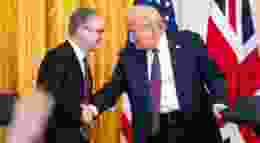
Writing a manifesto that stands the test of time
As we approach a General Election, parties of all colours are finalising their pitches to the nation. This is a time of great challenge and division. The UK's public services are in acute crisis. Political trust is on the floor. Inflation seems to have stabilized, but the impacts of an ongoing cost-of-living crisis persist in most households. Our people and communities are discontented with the country, discontented with our politicians, and distrustful of promises of what may come next.
Looking back can be healthy at such times, particularly when we emerge out of crisis only to lurch into another. So, it is worth recalling the work of Lord Michael Young, the radically educated, shy co-author of the 1945 post-war Labour party manifesto. He was also a prolific innovator and entrepreneur, with an exceptional ability to channel discontent into positive, enduring innovations; many of which continue to thrive decades after they were founded.
Young founded Which? magazine to give consumers more information about the products they were buying and prevent them being ‘hoodwinked’ by many of the audacious advertising claims made back in the 1950’s. The Open University, one of Europe’s largest universities, and its (still running) forerunner, the National Extension College, were created by Young to open remote access to learning for people who were not able to attend traditional colleges and universities. Both also pioneered the use of radio and television to educate outside the classroom. Then there’s the University of The Third Age (u3a), enjoyed by nearly half a million members across the UK who share skills and learn together. Another Young institution. And the School for Social Entrepreneurs, supporting the creation of socially impactful businesses; and the Economic and Social Research Council, the UK’s largest funder of economic, social, behavioural and human data science, originally set up in 1965 by Young as the Social Science Research Council.
Yet such organisations set up for social, education or professional purposes can get a bad press. They’re often seen as being part of the ‘establishment’; table-gnawingly slow to make change, and out of touch when they do. In a world of movements, networks, and fast-paced change, setting up an institution sounds neither exciting nor pioneering.
We know, however, that successful institutions tend to persist, even as political agendas and promises come and go. (It is, perhaps, no great surprise that the only legacy of ‘Come-back-Cameron’s Big Society policy agenda is institutional; with the National Citizen Service and Big Society Capital lasting the course in different ways.)
The striking thing about Young-founded institutions – and what today’s politicians might do well to note - is not just that they have persisted through the decades, but that they were all born of discontent. Discontent with the education system and how it was delivered. Discontent with consumers being tricked by advertisers. Discontent with the absence of social science being taken seriously in public policy. Discontent with the confines and concerns of private business. And that discontent was channelled into new social and institutional forms of innovation, producing genuinely useful, household-name institutions.
Young also talked openly about his distrust that his ideas would amount to anything, which allowed for ruthless interrogation of their worth, and a willingness to let them stand (or fall) on their own merits; to be evolved, embraced or rejected by their intended audiences and beneficiaries. Perhaps in the belief that all institutions over time tend to lean toward self-preservation and self-regard, he had even less regard for those that already existed, and continually challenged in whose interests they served. A strong proponent of nationalisation, for example, Young felt the new National Coal Board quickly became as distant from its workers as the private owners of the coal industry had been. Setting up a new institution or body in opposition to what has gone before is no guarantee it will work better for people or workers. The central message from Young was – and is - that institutions suffer when they do not support people or communities to have agency and ownership (literal or figurative) in their lives and work.
The involvement and empowerment of people is riven throughout Young’s innovations – and it’s a principle that might helpfully feature in any public policy agenda for today and tomorrow; whether transitioning to a green economy, nourishing a healthier population, or driving acts of devolution. Those objectives are not likely to be realised if we simply replicate existing institutional functions and structures. How many times, for example, have we talked, read and written about the common sense of investing in prevention of homelessness, poverty, crime, poor health? Yet we seem institutionally incapable of doing so. Perhaps that is where our ‘Common Sense Tsar’ might best focus her attention.
Rewiring how public, private and people work together or start institutions to meet present-day challenges won’t have much traction at the ballot box. But people want to feel hope, and they do desire change. The 2023 Edelman trust survey found that nearly three quarters of the UK population want new thinking, new ideas, and new approaches. That’s a lot of people - and Edelman places the responsibility to foster that new thinking at the door of Westminster.

The job of any government is to create the conditions for change to flourish. At the same time - to channel Young – any government also needs a healthy dose of distrust in its own capabilities, and needs to determine sensibly, and with vision, what ways of working and which institutions are necessary and desirable in a better, fairer future.
Whether considering the position and empowerment of people in a world of advanced AI; the reinvention of education and skills for a climate changed UK; or the reimagination of a National Health Service, not a National Sickness Service – there is both clear discontent in our existing systems and clear distrust of what may replace them.
Young would have said these are great drivers of positive change. And they might just be the vital ingredients of a winning manifesto.

Helen Goulden is Chief Executive Officer of The Young Foundation.













